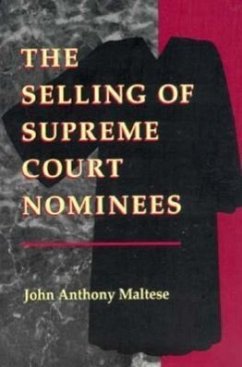In The Selling of Supreme Court Nominees, Maltese traces the evolution of the contentious and controversial confirmation process awaiting today's nominees to the nation's highest court. His story begins in the second half of the nineteenth century, when social and technological changes led to the rise of organized interest groups. Despite occasional victories, Maltese explains, structural factors limited the influence of such groups well into this century. Until 1913, senators were not popularly elected but chosen by state legislatures, undermining the potent threat of electoral retaliation that interest groups now enjoy. And until Senate rules changed in 1929, consideration of Supreme Court nominees took place in almost absolute secrecy. Floor debates and the final Senate vote usually took place in executive session. Even if interest groups could retaliate against senators, they often did not know whom to retaliate against.
Hinweis: Dieser Artikel kann nur an eine deutsche Lieferadresse ausgeliefert werden.
Hinweis: Dieser Artikel kann nur an eine deutsche Lieferadresse ausgeliefert werden.







